Why was Canaan the Promised Land?

Recently a person a Bible Workbook team member asked, “Why was Canaan the Promised Land?” (as opposed to any other land). One answer was: “because that land was particularly fertile.” Another answer was: “because the inhabitants of that land were particularly wicked, and God knew that.” Yet another answer was: “because that was the land God promised Abraham.” While there is truth to all of those responses and they are not mutually exclusive, they did not really satisfy us. One answer did make sense to us, and this blogpost explores that response as well as the others.
When it comes to deciding why Canaan was the “promised land,” one answer is that the land was particularly fertile. There is some reason for this answer. Canaan was known as a land “flowing with milk and honey” (Exodus 3:8, Leviticus 20:24, Numbers 14:8, others) – common euphemisms for an abundant land. The spies who were sent to scope out the land confirmed this fact (Numbers 13:27). There are at least two reasons this explanation is not enough to convince us when taken by itself. The first is that there were obviously other abundant areas nearby. In fact, only a sliver of Canaan itself is in what is known as the “fertile crescent” – a very large area of the Middle East also spanning parts of modern day Egypt, Syria, Jordan, and Iraq. Second, while it is true that some of the land of Canaan was fertile, other parts were either comprised of mountains, deserts, or were otherwise barren.
When it comes to deciding why Canaan was the “promised land,” one answer is “because the inhabitants of that land were particularly wicked, and God knew that.” There is some truth to this answer as well. When God first promised the land to Abraham (something we will consider in more detail below), he noted that even though Abraham’s descendants would go into slavery, that they would come back in the fourth generation because “the iniquity of the Amorites has not yet reached its full measure” (Genesis 12:16). In fact, God told Israel that if they did not drive out the wicked people from the area, they were so wicked that the land would “vomit them out” (Leviticus 18:28) and that they should plan to drive them out (Numbers 33:56, Deuteronomy 8:19–20, others) Some of them even worshipped a God named Moloch and would sacrifice children to him (Leviticus 18:21). There is one major reason this explanation is not enough to convince us when taken by itself: evil practices existed in fertile lands elsewhere too. God could just as easily decided to direct the nation of Israel there instead of Canaan.
When it comes to deciding why Canaan was the “promised land,” one answer is: “because that was the land God promised Abraham.” This is true according to Genesis 15:18-21. Abram (as he was known at the time) was living in Haran (thought to be in what we know today to be Southern Turkey on the border with Syria), when he was told by God to move and promised his descendants would live in Canaan (Genesis 12:5-6). He showed great faith by trusting God’s instruction (Hebrews 11:10). There is one major reason this explanation is not enough to convince us when taken by itself. It begs the question: why did God promise Abraham’s descendants would live in Canaan (as opposed to some other land) in Genesis 12?
We do not deny that there was a strong rationale at play in some of these reasons, which remember are not mutually exclusive. There is one explanation that one of our team members gave which we found even more compelling. That explanation is one which can be inferred from scripture. The explanation is that the land of Canaan (which would become Israel) would become a platform for the spread of the Gospel in fulfillment of Jesus great commission to “go into all the world and preach the gospel to all creation. Whoever believes and is baptized will be saved” (Mark 16.15).
Roughly four hundred years elapsed between the last Old Testament prophet, and the first event in the New Testament. This period is commonly called the “intertestamental period.” Four hundred years is a long time. During this period, the Persians were perfecting the sending of messages by relaying it from one horseback rider to the next, the Greek language was becoming ubiquitous, and the Romans were building roads to make it safer to travel overland, and the Phoenicians were building bigger and faster ships and improving maritime navigation (which the Roman empire would inherit after they conquered the Phoenicians).
Canaan would later become Israel, where the church began. As the disciples began to spread the word, they were aided by the common language (the NT is written in Greek), the roads, the ships, and the repeating horseback messages. This helps explain the timing of Jesus’s appearance, as Paul writes to the Romans: “at the right time, Christ died for the ungodly.” (Romans 5:6)
Israel was in a prime position to take advantage of these factors. It is the land bridge between Europe, Africa, and Asia (the “known world” at that time). Israel also had deep water ports and frequent ships departing for faraway places via the Mediterranean (the largest body of water in the “known world” at that time).
All of these explanations make some sense to us as to why Canaan was the promised land. All are complimentary and no doubt work together. The final explanation is the one that really clinched it for us.
